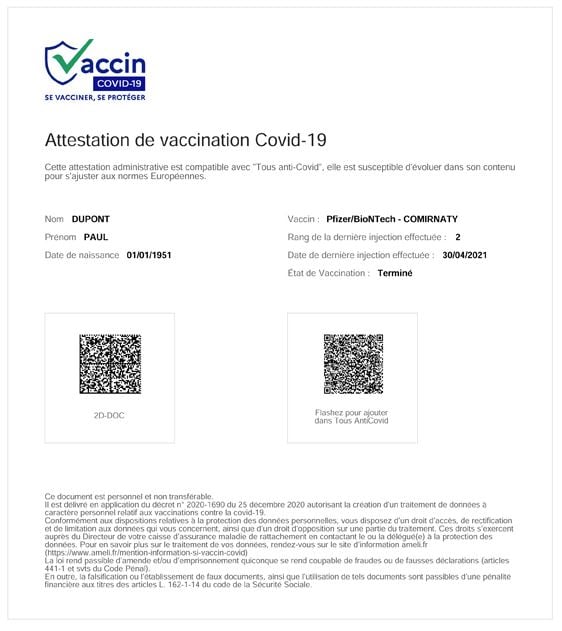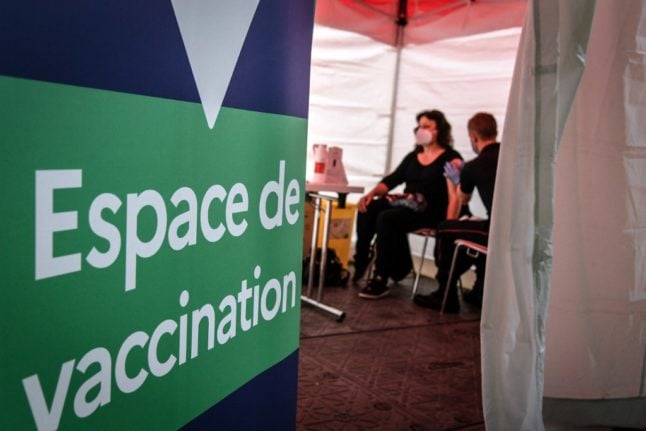If you are not yet vaccinated
People getting the vaccine now should be given the certificate when they get the injection.
This is a paper certificate with a QR code that can be scanned into the TousAntiCovid app to create a ‘health pass’ that, from June, can be used for international travel and to access certain leisure activities.
It looks like the example below and to upload it you open up the TousAntiCovid app, click on ‘my wallet’ and then ‘scan QR code’. Point your phone’s camera at the square code on the right hand side, and it will take a picture and then upload the certificate.

A carte vitale is not necessary to get the certificate.
READ ALSO How to book an appointment for a Covid vaccine in France
If you are already vaccinated
Since the certificates only started being given out at appointments from May 3rd, people who got their vaccine before that won’t have a certificate.
For most people, the easiest way for people to get them is via their Ameli account.
And from Thursday, certificates are ready to download for account holders. Simply log in to your account and head to attestation-vaccin.ameli.fr
Ameli is an online portal to the French health insurance system and if you don’t already have one – here’s how to set up an account.
If you don’t have a carte vitale
In order to set up an Ameli account, however, you need a French social security number, which is a problem for those not yet registered within the French health system.
We asked the health ministry what their advice was for people who do not yet have their carte vitale and therefore can’t use Ameli.
They told us: “These groups are invited to contact the vaccination centre or the doctor/pharmacist who performed the injection to obtain a paper certificate of vaccination.”
You should take along with you the certificate or card that you were given when you were vaccinated in order to swap it for the new certificate. All centres should be ready to do this from May 29th, but some centres have already begun.
Once you have the crucial certificate, you can scan it into the TousAntiCovid app and voilà you have a health passport.
READ ALSO How France’s ‘health pass’ will work



 Please whitelist us to continue reading.
Please whitelist us to continue reading.
Will visitors from overseas need/benefit from having a vaccination certificate?
We had our second jab last Friday (so after 3 May) in Cherbourg but they could not issue us with our certificates because we don’t have social security numbers. The very pleasant girl at the desk explained that they don’t have a way of issuing certificates to people without a social security number/Carte Vitale. She said they will hopefully find out how to do it and when they do they’ll send the certificates out to us. We believe her but are anxious that the system won’t allow us to have a certificate. Can The Local get any further clarification on this?
How do I get a ‘Health Passport’ with a US Vaccination Certificate that does not have a QR Code to upload?
If we can show evidence of having had both doses in the UK can we get a French certificate to add to out Tous Anti-Covid app?
I don’t have a carte vitale or Ameli account. I received my second jab on April 9 and received a vaccination certificate with a QR code from the City of Nice at that time, showing both vaccinations. (Note that this date is before the date your article says when QR codes will be included.) However, my QR code doesn’t work with the AntiCovid app.
Should I wait a few weeks and check it again or should I contact the City for a new QR code?
As I’ve had Covid I only get one vaccine and don’t yet have my CV ( applied for in October) will I still be able to get health certificate?
I am planning (hoping) to travel to France in July. I’m an American citizen and have been fully vaccinated since March. I have a card from the CDC and can easily link on my phone to the hospital system that houses all my information, including which vaccine I received and when. So…what am I supposed to do?
i have had both injections but it was before the beginning of May. I have the Anticovid app on my phone and want to get the Covid Passport. Is the number on my carte vitale a social security number? i cannot register on the Amelie site.
Yes it is. The number on the front which has bits of your DOB
It would be really useful if you could discover whether UK citizens will be able to use the NHS app to p[rove their vaccination status. I discovered this morning that the NHS app now creates a QR code (it didn’t yesterday!!!) which you can print or carry as a pdf – I have tried scanning this into the Tousanticovid app, but the app doesn’t recognise it….
Our primary residence is in the US, and that is where we were fully vaccinated. How do we prove this to the EU and specifically to France where our second home is? We have a vaccination card, but it is in English and has no QR code.
I had my 2 vaccines in Paris in May before I received my French social security number. I now have my Carte Vitale and have created an Ameli account. Does anyone know a way to link my previous vaccinations to show up in Ameli?